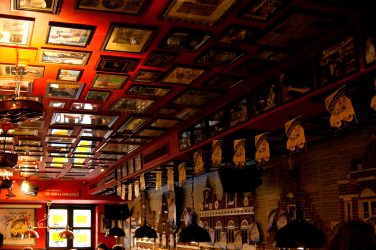The World Cup may be over, but for E&M author Fernando Burgés, it is definitely something to reflect upon. In this article he tries to find out whether the World Cup encourages extreme Nationalism.
Every four years, the phenomenon puzzles me. When the World Cup takes place, I can’t take my eyes off one thing – and I am not talking about football, even though I am a fan of the sport. It is the hysterical jubilation “round the flag” of a particular nation-state that intrigues me. If seen outside context, this euphoria could be easily labelled as a demonstration of xenophobic, right-wing nationalism. During the specific month of the event, however, it is taken for granted. Leaving the entertaining part of the World Cup aside, I wonder: what can we read between the lines of the frantic support for a national team by its people?

Being particularly interested in observing how the event reshapes the collective behaviour of a nation, I had the opportunity to watch the last edition of the World Cup from the Dutch perspective. As a Brazilian who lives in the Netherlands, my position regarding cheering nations is a very critical one: I belong to a not insignificant minority of Brazilians who not only refuse to cheer the seleção but supports the opposing team, whoever it may be. Goals scored against the squad that represents the country I was born do not hurt me! This skepticism, however, is not driven by any kind of hatred towards Brazil, but rather by a kind of sarcasm about this seasonal epidemic of nationalistic euphoria.
So, am I suggesting that any kind of support for the national team that matches with the one written on your passport is a passive aggressive kind of xenophobia? Well, not quite. In fact, I agree that the World Cup with the passion bits cut off would be deadly dull. The point in question is about how football becomes the pretext for expressing this hyperbolic type of passion for the nation.
Wij houden van Oranje
We love the Orange – as the Dutch call their national team – is a very clear demonstration of the so-called “pride” of being a national from this country and not from any other. Watching a Netherlands World Cup match mingled among Dutch people is quite a revealing experience. As usual, flags, banners, shirts, orange from head to toe. Several thousand people who never saw each other in their lives, feeling a sense of belonging to the same family. Chant after chant, a collective catharsis unfolded before my eyes after the staggering victory against Spain in the first round of the tournament. That evening, what I saw in the streets of Amsterdam made me wonder whether I was watching a reenactment of the day of liberation from the Nazis in 1945. As the citizens celebrated with a wildness that bordered on genuine insanity, there was a sense of being in a lawless land for a night – the streets were saturated with alcohol, urine and noise, traffic could barely move and strangers were randomly hugging all over the place. Among the orange mass, I insisted in a few chats with some of the most excited, asking the reason for such happiness. Excluding the most alcoholic testimonials, I can definitely say: those guys were celebrating the delight of being Dutch. High self-esteem wearing orange, throughout the dawn the celebration was some kind of a ritual of thankfulness for belonging to The Netherlands.
World Cup is not about football
In a nutshell, nationalism is a metaphoric kinship ideology, the expression of a sentiment of belonging. It seems fine to celebrate a common cultural and historical legacy, but what kind of message is conveyed when this type of celebration becomes so, let’s say, passionate? Doing an exercise of reverse engineering, the idea of nation presupposes that there are other nations which are not members of this nation. It is a type of manifestation that, above all, highlights the existence of something that does not belong, the “other”. This sentiment brings people together by delimiting a boundary which the stranger is placed outside. To some extent, this is the origin of the sentiment that triggers xenophobia.
In the football context, there is a huge distinction between the kind of symbolic meaning that people attribute to national teams and the kind of passion devoted to football clubs. Supporting Arsenal, Red Star Belgrade, Real Madrid or any other private football institution is based on reasons that stem from deliberate, free choice of the individual. Cheering national teams, even though the sport being played might be the same, has a source of meaning of a different kind. When a result of a match is jaw-dropping, it is very common to see not only the media but celebrities, politicians and the overwhelming majority of the population mourning the disastrous result by using words such as “shame” and “humiliation”. A very good illustration, to my understanding, on how the game crosses the border of being a mere sporting event.

Glory and Shame
As George Carlin used to say, “pride should be reserved for something one achieves on their own, not something that happens by accident of birth”. Being French or German is not a skill. Feeling deeply humiliated because eleven players lost a match against other eleven players from a different nation state is the clearest symptom of how much the issue of ethno-national superiority is so deeply rooted in the minds of the people. If this is not true, what were 400,000 Germans celebrating at the Brandenburg Tor, welcoming the players as true heroes? It could have been France, England or any other team, we all know that the celebration would be more or less the same. Under the layers of festivities, colours, symbols, chants and slogans, there it is, this obscure desire to celebrate superiority over other nations.
Among several reasons not to support a national team during the World Cup – such as some disgracefully corrupt national Football Confederations or to prevent a government to “free ride” politically on the success of the squad – some people simply opt not to take part into this nationalistic frenzy. Behind such protests is the negation of this silly kind of patriotism that becomes the leading religion for a month. The opportunity to mock someone from a different country because “they” lost a match shows how the adorers of globalisation are wrong when they say that the age of the nation-state is doomed. Especially in Europe – this piece of land that has been drawn and redrawn on the bullet for the last many centuries – nationalities are still an identity haven for its people, with football as a pretext to legitimise it.
Don’t get me wrong, I am not proposing some radical position towards the topic; just some thoughts on a behaviour that few seem to realise during the World Cup. General Clausewitz famously said that “war is politics by other means”. The World Cup, as a strong metaphoric warfare between nation-states, makes me wonder: wouldn’t the event be the seasonal opportunity to celebrate nationalism by euphemistic means?
Cover photo: Gustave Deghilage, CC BY-NC-ND 2.0 (flickr)










